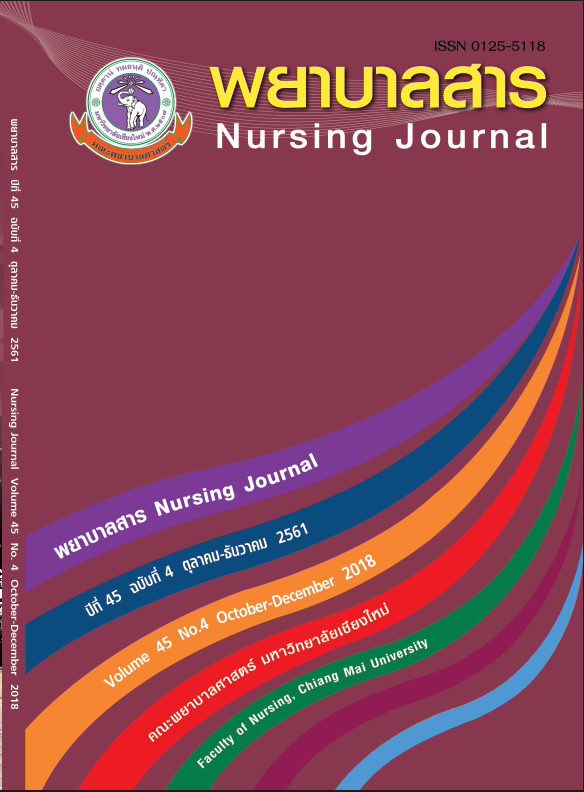Effectiveness of Relaxation Training Program and Education Provision for Women with Preterm Labor
Keywords:
Relaxation Training, Preterm LabourAbstract
Stress in women with preterm labor is the cause of unsuccessful inhibit of labor.Therefore, stress management and the knowledge about premature labour pain will assist mothers who are at risk for premature labor having a better stress management. This quasi-experimental research was designed to compare the stress scores between the group receiving program of relaxation training educational provision and the group receiving usual care. The data collection was conducted between August 2016 and February 2017 in labour room at Chumphonkhetudomsak Hospital. Forty participants were purposive sampling and assigned to the control group and the experimental group as 20 subjects each group. The instruments for the intervention consisting of 1) The relaxation training video by the Thai Ministry of Health
2)Teaching plan relaxation training program and education provision for women with preterm labor 3)The handbook of preterm labor knowledge and 4) Mini hand book stress relaxation training recorded.The instruments for data collection consisted of a demographic data form and the Suanprung stress Test-20 (SPST-20) Data were analyzed using descriptive statistics and dependent t-tests.
The study found that the experimental group receiving the program had significantly lower stress mean score than the control group receiving usual care (p<0.05).
The results of this study suggest that utilizing the relaxation and educational program for women with preterm labor could reduce the stress.
References
American College of Obstetricians and Gynecologists (2016).Preterm-Premature labour and birth. retrieved from https://www.acog.org/patients/faqs/preterm-premature-labor-and-birth.
Bain, E, Heatley., E, Hsu. K., & Crowther, C. A., (2013). Relaxin for preventing preterm birth (Review). retrieved from https://www.adelaide.edu.au.
Blencowe, H., Cousens, S., Oestergaard, M. Z., Chou, D., Moller, A.B., Narwal, R. (2012).National, regional, and worldwide estimates of preterm birth rates in the year 2010 with time trends since 1990 for selected countries: a systematic analysis and implications. Lancet, 379(9832), 2162-2172.
Chawanpaiboon, S., & Kanokpongsakdi, S. (2012). Comparison of nifedipine and bedrest for inhibiting threatened preterm labour. Gynecology & Obstetrics, 2(5),1-4.
Chuang, L. L., Lin, L. C., Cheng, P. J., Chen, C. H., Wu, S. C., & Chang, C. L.(2012). Effects of a relaxation training programme on immediate and prolonged stress responses in women with preterm labour. Journal of Advanced Nursing. 68(1), 170-180.
Cunningham, F. G., Levono, K. J., Bloom, S. L., Spong, C. Y., Dashe, J. S., Hoffman, B. L., Casey, B. M., & Sheffield, J. S. (2014). William obstetrics (24thed.). New York: McGraw-Hill.
Dempsey, P. A., & Dempsey, A. (1992). Nursing research with basic statistical application. (3rded ).Boston: Jones and Bartlett.
Gabriel, D. S., William, D. F., Martin, G. F., & Jean, R. S. (2013). Psychosocial stress in pregnancy and preterm birth: associations and mechanisms. Journal Perinatal Medicine, 41(6), 631–645.
Hoglund, E., & Dykes, A. K. (2013). Living with uncertainty : A Swedish qualitative interview study of women at home on sick leave due to premature labour. Midwifery, 29, 468-473.
Hyagriv, S. N., & Iam, J. D. (2014). Preteam labour and birth. In: Creasy, R. K., Iams, J. D., Lockwood, C. J., Moore, T. R., Greene, M. F, editor. Creasy and Resnik Maternal-Fetal Medicine:Principles and Practice.7thed :Saunders.
Kanjana Srisawad, Punpilai Sriarreporn, Jantararat Chareonsanti. (2558). Effects of education provision and relaxation training on stress among Pregnancy Adolescents. Nursing journal, 38(1), 40-45. (in Thai)
Miller, L. H., Smith, A. D., & Rothstein, L. (1993). The stress solution: An action plan to manage the stress in your life. New York : Pocket Books.
Thitigan Na Pun. (2014). Factors associated with preterm birth among pregnant women at Aomkoi hospital Changmai province. Lanna public health journal.10,(2),142-150. (in Thai)
Varvogli. L & Darviri. C., 2011. Stress Management Techniques: evidence-based procedures that reduce stress and promote health. Health Science Journal. 5(2), 74-89.
Wadhwa, P. D., Entringer, S., Buss, C., & Michael, C. L. (2011). The Contribution of Maternal Stress to Preterm Birth: Issues and Considerations. Clinics Perinatology, 38(3), 351–384.
Downloads
Published
How to Cite
Issue
Section
License
บทความที่ได้รับการตีพิมพ์เป็นลิขสิทธิ์ของวารสารพยาบาลสาร
ข้อความที่ปรากฏในบทความแต่ละเรื่องในวารสารวิชาการเล่มนี้เป็นความคิดเห็นส่วนตัวของผู้เขียนแต่ละท่านไม่เกี่ยวข้องกับมหาวิทยาลัยเชียงใหม่ และคณาจารย์ท่านอื่นๆในมหาวิทยาลัยฯ แต่อย่างใด ความรับผิดชอบองค์ประกอบทั้งหมดของบทความแต่ละเรื่องเป็นของผู้เขียนแต่ละท่าน หากมีความผิดพลาดใด ๆ ผู้เขียนแต่ละท่านจะรับผิดชอบบทความของตนเองแต่ผู้เดียว






